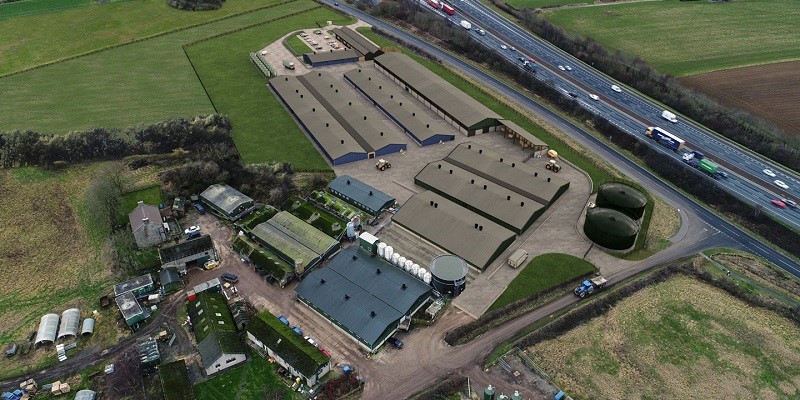Expansion includes three-fold increase in farm's capacity from 200 to 660 sows, including 220 sows that will live outdoors.
December 2, 2019

The University of Leeds in the U.K. recently opened the National Pig Center, which will enable researchers to gain new insights into pig management through the use of precision nutrition and 24-hour monitoring.
According to the announcement, scientists from a range of disciplines at the university will use new state-of-the-art facilities to help improve the sustainability and efficiency of pig production.
The National Pig Center will be a leading research facility for pig nutrition, behavior, health and production system research — all themes identified by the livestock industry as central to improving quality, productivity and future competitiveness.
Supported by more than £11 million of investment, the facilities make Yorkshire, U.K., one of the best places in Europe for pig research, the university said.
“This new center allows us to expand our work to improve the welfare of pigs and the sustainability of the British pig industry," professor Lisa Collins, academic lead for the PigSustain project and head of the University of Leeds’ School of Biology, said. “Our aim is to lower the environmental footprint of pig farming while ensuring that high welfare standards are maintained.”
The new center will benefit from academic expertise drawn from across a range of disciplines, including nutrition, health, behavior and fertility as well as computer vision, engineering, soil and water sciences, data analytics and atmospheric and climate science, the university said.
It has been launched in partnership with the Centre for Innovation Excellence in Livestock (CIEL). CIEL has invested £4.5 million with funding from Innovate UK, the U.K.’s innovation agency.
The investment includes a three-fold increase in the previous capacity of the farm, from 200 to 660 sows, ensuring that research carried out at the center better represents commercial pig farming. Of these sows, 220 will live outdoors.
The combination of an outdoor sow unit with an indoor system is unique in Europe, enabling direct comparison of the different rearing systems, Leeds said.
Academics will work to identify the key factors contributing to the environmental footprint of pig farming and attempt to find alternatives that could drive down the sector’s greenhouse gas emissions.
The center’s indoor facility includes the ability to perform in-depth, automated nutrition trials to understand how best to feed and manage pigs at all stages of production, Leeds said. By harnessing precision nutrition, based on individual requirements, the aim is to reduce the cost of production, improve feed efficiency and reduce the environmental impact of pig farming.
Researchers will also be able to make feed recommendations that keep pace with ongoing genetic improvements to pigs.
The indoor facility is equipped with closed-circuit television throughout, permitting around-the-clock observations of individual pig behavior at all stages of production. Researchers will use computer vision to automate data collection from the video footage so behavior and nutrition can be monitored at the individual pig level, the announcement said.
Students from across the university will have the opportunity to study at the National Pig Center as part of their degrees, and some will have chance to contribute to research projects taking place at the farm.
University of Leeds vice chancellor Sir Alan Langlands said, "Leeds is proud to be working in a number of ways at home and internationally to improve food security and the sustainability of the agricultural sector. The National Pig Center will provide a key national resource for industry to work in partnership with the university to develop innovative and practical solutions that make a positive contribution to the economy, environment and society."
Collaborating with industry
Centrally located in the U.K., the center will promote engagement, discussion and collaboration between researchers and the industry. The university and CIEL will work together to drive this process.
As a membership organization, CIEL works with businesses across the livestock supply chain to identify and develop research needs and build relevant collaborations to deliver new technologies and processes that address key challenges facing the sector.
"We're very proud to work with Leeds and develop this first for the pig and pork industry,” CIEL chief executive Lyndsay Chapman said. “It provides unique research capability on a commercially relevant scale and complements the investments we’ve made across the CIEL network. Through our nationwide collaborative alliance, we're working to ensure industry has access to the very best expertise in this field of research."
Projects at the National Pig Center will help tackle some of the current challenges in pig production, including:
• Nutrition -- Developing precision feeding for livestock to improve sustainability and productivity and study the effects of nutrition on welfare and behavior;
• Antimicrobial resistance -- Developing healthier pigs with more robust gut health and improved resistance to disease, thereby reducing antibiotic use;
• Production systems -- Improving efficiency of production and identifying better ways to feed and manage pigs, and
• Animal health -- Monitoring pig behavior and developing algorithms to allow for early detection of health conditions.
You May Also Like


.png?width=300&auto=webp&quality=80&disable=upscale)
